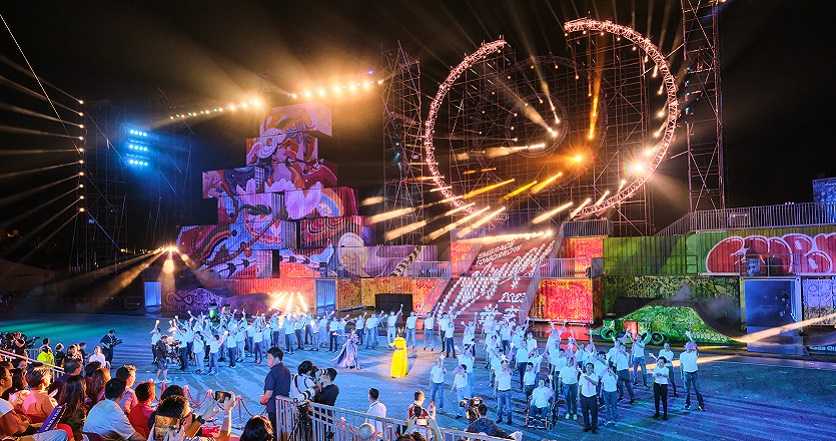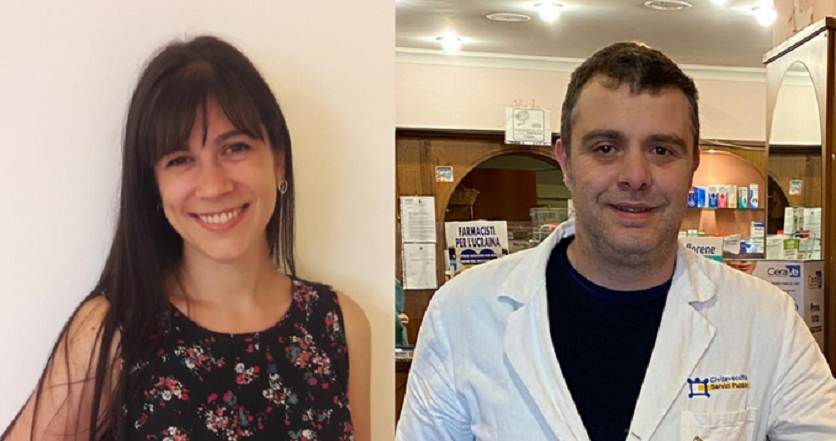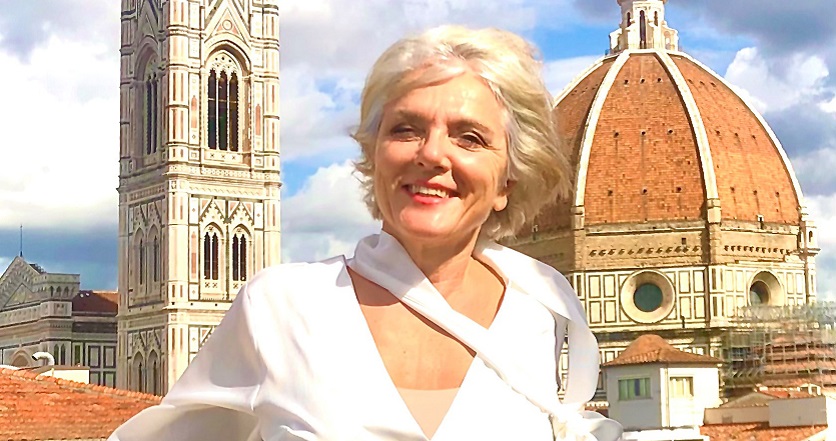Two Brothers on Buddhism and the Future of Fashion
“Style can’t be mass-produced,” say Satoru and Kiyoshi Inoue, Soka Gakkai members and founders of a design/art studio and clothing brand. In this interview, the brothers discuss the ideas behind their brand and their vision for the future of sustainable fashion. Founded in 2004, their business is based on direct trade and ethical production processes.
What are the ideals and motivations that guide your work—both in an artistic and social sense? What are the sources of your inspiration?
Satoru:We were born to Japanese parents and raised in Copenhagen, Denmark. Back in the late 1970s, there were not many immigrants in Denmark.
Kiyoshi:Growing up, we were always a family of “foreigners”—we looked different from the local Danish people, and our parents struggled with the language barrier, culture gap and prejudice. Because of this, we naturally made a network of friends who came from various ethnic and social backgrounds.
Satoru:Our father, Mutsuo, who passed away in 1993, was a glass artist, and our mother, Satsuki, worked for Japan Airlines. In those days, it was hard to get by as an artist, which meant that our mother’s humble income had to support the entire family.
Growing up in a lower middle-class family and being children of immigrants made us feel strongly connected to less fortunate people. From a very young age, we understood that we are all a part of each other—that no borders, social status or race can keep human beings apart. But this way of seeing things, which we inherited from our parents, also made us realize how much injustice and discrimination there is in the world.
Our Father
Kiyoshi:Social justice and the empowerment of the common people were always the main focus for our father. We remember clearly when our father came back from an exhibition in South Africa during apartheid and told us about the injustice he had witnessed with tears in his eyes.
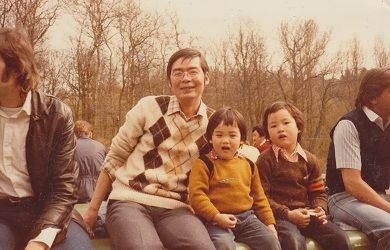
He believed that art should always be for the common people. More important than receiving praise from the elite, it should evoke hope and strength in ordinary people. He taught us that art and culture that don’t change society for the better are meaningless. He often said: “In the natural world everything is a part of a universal harmony, everything is in balance. It might be survival of the fittest, but there is no discrimination. Even the smallest insect or plant has a unique role in the holistic symbiosis.”
Satoru:Our parents were also devout Buddhists and members of the Soka Gakkai. They were among the first Buddhists in Denmark, and we grew up watching them being dedicated in sharing Buddhism with other people and experiencing joy in living an altruistic life. As such, we were naturally raised with Buddhist values and principles.
The only thing constant is change. Everything is transient . . . Nature is the ultimate teacher of life.
Our father would often share with us the writings of Nichiren and teach us the importance of nature and coexistence. I remember him telling us: “The only thing constant is change. Everything is transient. Beauty and aesthetics are momentary expressions of the ever-changing reality. Aesthetics should be an expression of inner beauty, a homage to life and an expression of a creative interaction between the inner spiritual world and the outer material world. Nature is the ultimate teacher of life.”
Another lesson he impressed upon me was that everything comes from the Earth and that nothing natural is totally black. Everything is in shades of grey. All colors in life are reflections of light.
Kiyoshi::During the 1980s, President Daisaku Ikeda often came to Europe, and our father was very active in coordinating and planning these visits. Our father passed away when Satoru was 15 and I was 12. He was still young, but through his relationship to his mentor President Ikeda, he managed to teach us how important it is to have a great mentor in life. Regardless of faith or religion, we believe that if you are able to find a mentor in life that motivates and inspires you to live your life to the fullest, you are a very fortunate person. We feel happiness and gratitude for having the same mentor in life as our father.
Business Philosophy
Satoru:In 2001, we decided to start our own design company. Daisaku Ikeda’s historical novel The Human Revolution was a big inspiration for how to do this. The novel is based on the life of second Soka Gakkai president Josei Toda, who was President Ikeda’s mentor. Reading the novel, I learned about how Josei Toda ran his business. It was a revolutionary business model that didn’t regard profit but positive social change as the main goal. This novel has been the manual for our business style.
We found out very quickly that fair trade was not always about doing something fair or good. Rather, it was often about companies trying to avoid responsibility.
We went to some facilities that were considered the most representative of fair trade practices and were surprised by the working conditions. Fair trade is about having a window or toilet or maybe some music playing in the background. Workers care about whether you respect them or not, and when we looked at many of their working conditions, we felt they did not represent respect.
Kiyoshi:Our business philosophy is based on direct trade; a trade method that we believe is the future way of doing business. It is an ethical method where we focus on having direct contact with all the links throughout the supply chain, cutting out all middlemen, agents and distributors. In this way, we ensure direct contact with everyone we work with. This is an expression of utmost respect that goes beyond the traditional concept of fair trade.
Satoru:The reason we want to do this is because the extra cost of paying middlemen will ultimately become a burden to the end users, who are our customers. At the same time, we can secure the best profit for those at the lowest end of the supply chain, who are often the ones exploited by modern industry.
Kiyoshi:Our concept is very simple—empowerment through business. We live in a world where constant growth and cost efficiency are more highly valued than a sustainable way of thinking that strives to strike a balance between humanity and nature.
We feel that modern corporate thinking with its focus on “more” has generated an inconspicuous greed that has in turn given rise to the kind of self-destroying logic that justifies environmental and human exploitation. This way of thinking has created the foundation for mass production, a model that is glorified because it results in lower and lower prices while simultaneously generating unimaginable wealth for a minority, the industrial oligarchs.
Through an ethical production process, we hope to redirect attention to what we believe is of true value, offering the end user an alternative way of consuming and the opportunity to support a business model that doesn’t compromise on human values and quality. Instead of convincing customers to buy more and more just to satisfy investors, we are trying to make products that last longer and provide a brand experience that gives more to the customer than just a trendy item with superficial benefits.
Much of your work seems to involve collaborating and working closely with different communities and groups of people, ranging from indigenous communities to high-end fashion designers. Could you give some examples of these collaborations and how they came about?
Satoru:In 2006, a good friend of ours was writing a thesis on the alpaca industry in South America for the University of Copenhagen. The main theme of his research was why such an amazing material as alpaca fiber was struggling to enter the international market and why the herders who live side by side these animals are among the poorest of the South American people. As a part of his research, he invited us to join him on a trip to Bolivia to view the situation from the perspective of designers and to get an alternative opinion on the matter.
From Bolivia, we also travelled to Peru in search of the finest fiber in the world and as a result forged a partnership with Pacomarca Farm located in Puno Province in southern Peru.
-
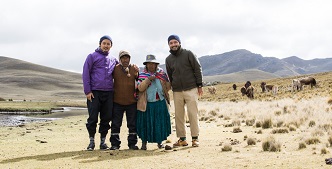 With farmers in Puno Province, southern Peru [© Lennert Rog]
With farmers in Puno Province, southern Peru [© Lennert Rog] -
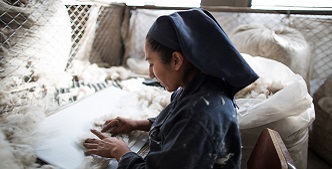 Working with alpaca wool [© Lennert Rog]
Working with alpaca wool [© Lennert Rog]
Kiyoshi:Pacomarca is a research facility that was launched to tackle the steady decline in fine fiber production over the past 30 years in the Andean region. The heritage, culture and way of life of the indigenous communities in these harsh, rural environments have been jeopardized by the government’s abandonment of their interests and the lack of support and investment from educational organizations. More than five million indigenous people live below the poverty line in Peru, making them the poorest people in the country.
Pacomarca holds seminars for the herding communities, teaching them basic shearing techniques and fiber sorting procedures. This empowers the herders with knowledge to generate a much greater income from their existing herds—up to a 25 percent increase— without having to invest in expensive equipment.
It is in no way a charity but a win–win situation for all of us. Our relationship with Pacomarca has resulted in being able to produce the finest alpaca wool available in the world today. However, the main reason for our love of alpaca fiber is the people who live with the alpaca. The lifestyle and strength of the alpaca herders is deeply inspiring and reminds us of the irreplaceable value of the natural world and the rich values of a humanistic lifestyle.
Satoru:Since May 2011, we have also been working with Japan’s Tohoku region, which experienced devastation from the tsunami caused by the country’s most powerful earthquake on March 11, 2011.
I remember clearly the day it happened. It was still early in the morning in Europe, and from around seven or eight o’clock I started receiving phone calls and messages telling me to turn on the news. The moment I saw the first images I was stunned and shocked.
A few minutes later, my brother called from London saying, “Brother, are you watching the news? We have to do something. We have to help in whatever way we can.” Then we went silent, eyes glued to the screen as we watched the situation worsen.
Kiyoshi:We went to Japan two months later.
When we arrived, we had no idea what we were going to do. We had just jumped on the plane with a strong determination to do something no matter what. We started calling and meeting with our friends and partners in our network to ask for guidance and ideas on how we could be involved in supporting and creating work for the people of Tohoku.
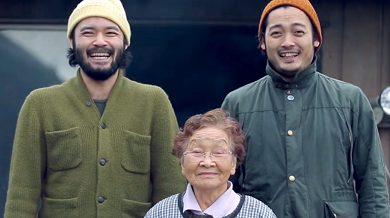
We were so sad and disappointed to hear that several major Japanese brands and retailers chose to cancel their orders instead of supporting the area in these hard times. Learning of the region’s textile heritage, we created a collection of simple T-shirts engaging factories that were still operational but without work. Since the initial collection, we have kept working and increasing production to continue our support of the Tohoku region.
How has it been working together as brothers?
Satoru:I think the biggest joy of working with my brother is that we can really, really disagree and fight without having to worry about whether we will be together the next day. Knowing that no matter what, we will always be brothers gives me a feeling of security and support. Maybe sometimes it’s harder because we’re so close, but it’s also definitely one of the biggest benefits of working with my brother.
Kiyoshi:There are definitely more pros than cons, whether that’s 51% some days or whether that’s 99.9% other days. But that’s the joy of working together as brothers.
What is your vision for the future of your company?
Satoru:We know that we are still a small player in an extremely complex and cruel industry—the fashion industry—but we want to always strive to become a brand that can inspire and influence the big corporations to change their way of doing business, to adopt a business model where people and positive change are considered more important than profit and growth.
Kiyoshi:And a really nice bonus is that doing that work starts to feel so good and invigorating!
Satoru:One of the most important lessons that we learned from our father was that there is one tool you can use that works anywhere in the world—that is sincerity. Whether you are talking to a president of a company or a worker in the street, sincerity is something that always touches people. It takes a lot of courage, especially in the business world, to be as open and honest as possible. This world is often controlled by strategies and hidden agendas, so we need to manifest the courage to be ourselves—to be honest and open—and, when we do, we can see the effect and it all makes sense.
Kiyoshi:You don’t have to even speak the language. Sincerity is a language in and of itself, of humanity. It may sound abstract, but when you put it into practice, it works.





